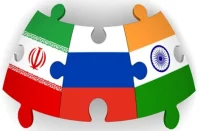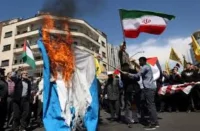Evgeny VELIYEV (Russia)
Sanctions have strengthened Ahmadinejad.
Turkey intends to continue supplying Iran with petroleum products despite the threat of sanctions from the United States, according to an article in the Israeli newspaper Jerusalem Post referring to an announcement by Turkish Energy Minister Taner Yildiz. “If the preference of the private sector is to sell these products to Iran, we will help them,” he said.
Tüpraş, Turkey’s only exporter of gasoline and other petroleum products, is not worried about retribution from the US Treasury Department, which under American law can block access to the US banking system and cancel contracts with companies that violate the sanctions regime. “For us, Iran is more important than America because we get crude oil from them. We don’t get anything from America,” said a Tüpraş spokesman.
Along with China, Turkey became one of Iran’s main suppliers of gasoline after the United States imposed sanctions, writes ITAR-TASS. Many other foreign partners have refused to enter into contracts with Iran, causing a 50% drop in oil product imports by the Islamic Republic. In July of this year Iran imported about 60 thousand barrels of gasoline, diesel fuel and kerosene per day, compared with 120 thousand barrels in May.
The bill signed by US President Barack Obama on July 1 imposing sanctions on companies supplying fuel to Iran has not been officially approved by either the UN or by EU countries. Nevertheless, many firms in the EU and a number of other countries have stopped cooperating with Tehran under financial pressure from Washington.
For openers, Turkey is not the only country that intends to continue supplying petroleum products to Iran despite the threat of US sanctions. France, which has always advocated tough sanctions against Iran, was against the embargo on supplying it with petroleum products. Christophe de Margerie, head of the French corporation Total, believes that it was a mistake to embargo the sale of petroleum products to Iran.
Speaking at an economic forum in Aix-en-Provence in southern France after the sanctions were imposed, de Margerie said that Total has suspended oil sales to Iran. He said that the decision was made in line with positions taken by United States and the European Union unilaterally imposing limits beyond those approved by the Security Council on June 9.
“I’ve maintained this is a mistake. We do not think an embargo on the delivery of petrol products is a good way to settle differences of a political nature. It affects the population,” said de Margerie. He said Total would resume deliveries “at the first opportunity.”
But there is something else going on. Such independence on the part of Turkey cannot help but arouse suspicions in both the United States and Europe. Ankara has always shown loyalty and dedication toward the Western bloc.
Recently, however, disagreements have been growing on several issues, especially Turkey’s accession to the EU and Ankara’s objections to new sanctions against Iran.
Turkey believes that it has opportunities for a diplomatic solution to the problem of Iran and its clandestine nuclear program. Turkey possesses a unique combination of economic and diplomatic tools of influence. Its economic cooperation with Iran is strong. Its trade volume with the country comes to approximately $10 billion annually. Nor should we forget the well-established close personal ties between Turkish Prime Minister Recep Tayyip Erdoğan and Iranian President Mahmoud Ahmadinejad, who call each other friends. Although Turkey’s statements may discourage those who hope for its assistance in isolating Iran, it is entirely possible that the Turkish authorities are not as uncompromising as they appear. The crucial thing is that Turkish officials are aware of and recognize the danger posed by Iran’s nuclear program. It is not a matter of principle, but of Turkey’s orientation toward the West in the post-republic era. A break with the United States and Europe over such an important issue would mean Turkey is backing away from the Western alliance. Few people believe that Turkey is willing to go that far. Turkey looks more like an expanding power that finds itself caught between two strong poles than an assertive and independent actor in the Middle East.
Thanks to its diplomatic efforts, Turkey has achieved its intermediate goal of establishing good relations with all parties. However, it has been unable to reach its long-term goal of reducing tensions between Iran and the West.
Still, by signing the Tehran Declaration Iran has made sure that Brazil and Turkey would back its security and interests. Brazil is Tehran’s cherished partner in Latin America and a critic of the United States, although not as harsh a critic as Venezuela. As for Turkey, it recently has been seeking close relations with Iran. It remains to be seen how close their relationship is, but at present Ankara supports Tehran in many regional and global issues, at least verbally, while at the same time it continues to pull away from its former partner—Israel. Sooner or later the interests of those two powerful regional states will surely collide, one way or another. But until that happens, their tactical alliance will play an important, if not decisive, role in shaping the political atmosphere in the Middle East.
On the other hand, like it or not, the negative reaction of the United States and the European Union to the Tehran Declaration has made Brazil and Turkey responsible for defending Iran in international forums, as has happened in the UN Security Council and may happen at the next IAEA summit and any other major event. In addition, Iran hopes to overcome the effects of the sanctions through close economic cooperation with Turkey, Brazil and several Latin American countries suffering under US policies. On the other hand, although there has been a lot of talk, no one knows how effective the sanctions have been.
It looks like Resolution 1929 adopted by the UN Security Council on June 9 imposing the fourth sanctions package against Iran since 2006 and the unilateral sanctions bill passed by the U.S. Congress have had no effect. Tougher sanctions have not helped solve the Iranian nuclear problem; the results of the unilateral sanctions are less than ideal. That is confirmed by projections made by the majority of the international think tanks that study the region, especially the International Institute for Strategic Research in London. According to those forecasts, the sanctions will not yield even 30% of the expected results. That is especially important in light of the numerous opportunities available to Iran for overcoming the effects of the sanctions.
In one of his speeches on the issue, Ahmadinejad stressed that Iran is capable of supplying all of its own needs, including gasoline. The head of the Iranian parliament’s National Security and Foreign Policy Commission, Alaeddin Boroujerdi, emphasized that the US sanctions are helping Iran to become self-reliant, including in oil and gas supplies. Iran is capable of meeting domestic demand with its domestic capacity and other sources.
Iran is also seeking to minimize the economic impact of sanctions by reducing costs. The country’s leadership, it seems, is relying on its own capabilities and resources and on foreign alternatives that do not require direct interaction, avoiding limits imposed by the sanctions. In fact, over the course of many years Iran has successfully adapted to US sanctions and learned always to find foreign partners that agree to supply everything it needs to implement its plans for developing its nuclear and military industry.
And most importantly, the new sanctions against Iran have given the regime the help it needs domestically by relaxing reformist pressure from the opposition that threatened the regime’s stability. Opposition to the regime became impossible after the new sanctions were imposed because the immediate reaction to it would be an accusation of treason. So the expectation that the worsening situation within the country will lead to “revolution” may not prove out.
Mehdi Karroubi, an Iranian opposition leader, said in an interview with the Guardian newspaper that the international sanctions imposed on Iran are not helping democracy to develop in the country and have actually strengthened President Mahmoud Ahmadinejad. “These sanctions have given an excuse to the Iranian government to suppress the opposition by blaming them for the unstable situation of the country,” said Karroubi. He added that the sanctions have thus been a real gift to Iran’s government.
He admitted that Iran is currently having serious economic problems. “On the one hand, the government’s mishandling of the economy has resulted in deep recession and rising inflation inside the country, which has crippled the people of Iran and resulted in the closure of numerous factories. On the other hand, we have sanctions which are strengthening the illegitimate government,” he said.
Karroubi took part last year in the struggle for the presidency of Iran. In the end, Ahmadinejad was reelected, but the opposition accused Iranian authorities of rigging the vote.
Source: New Eastern Outlook














Comments